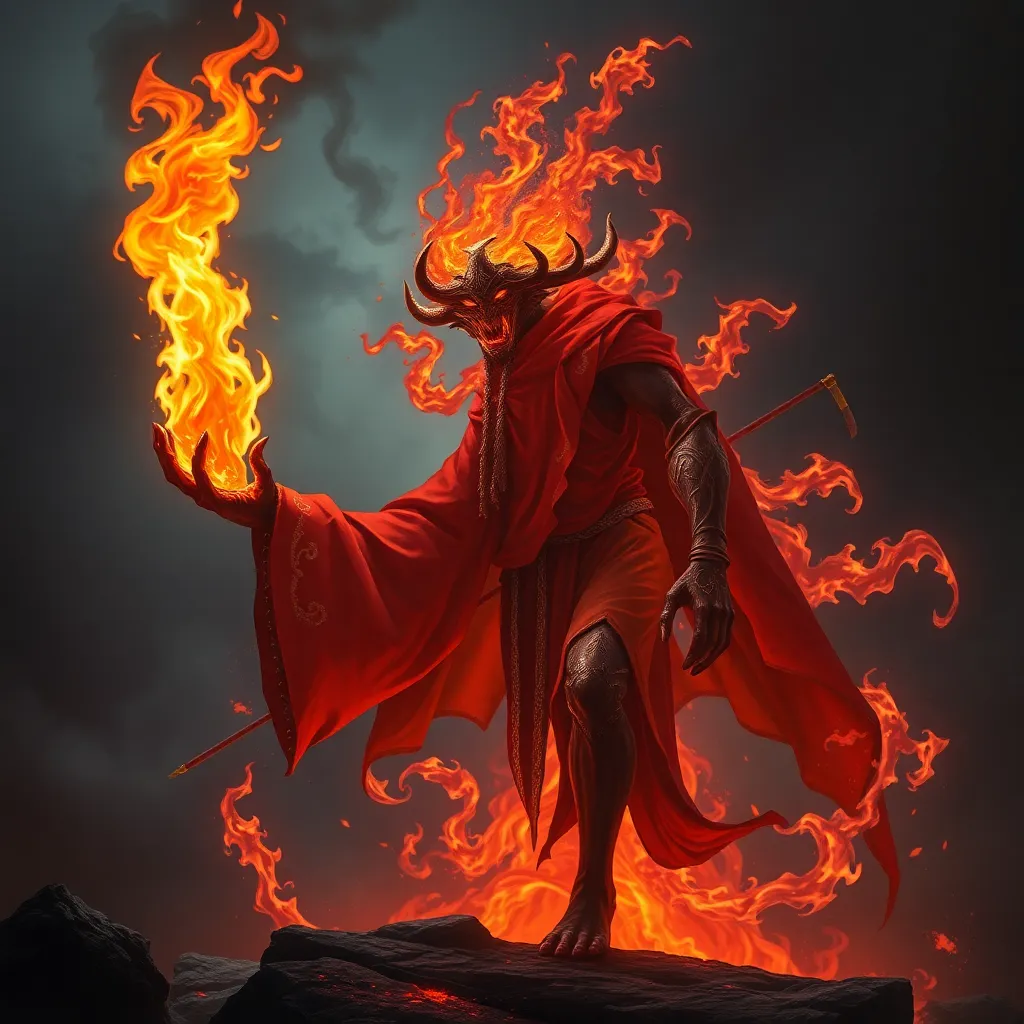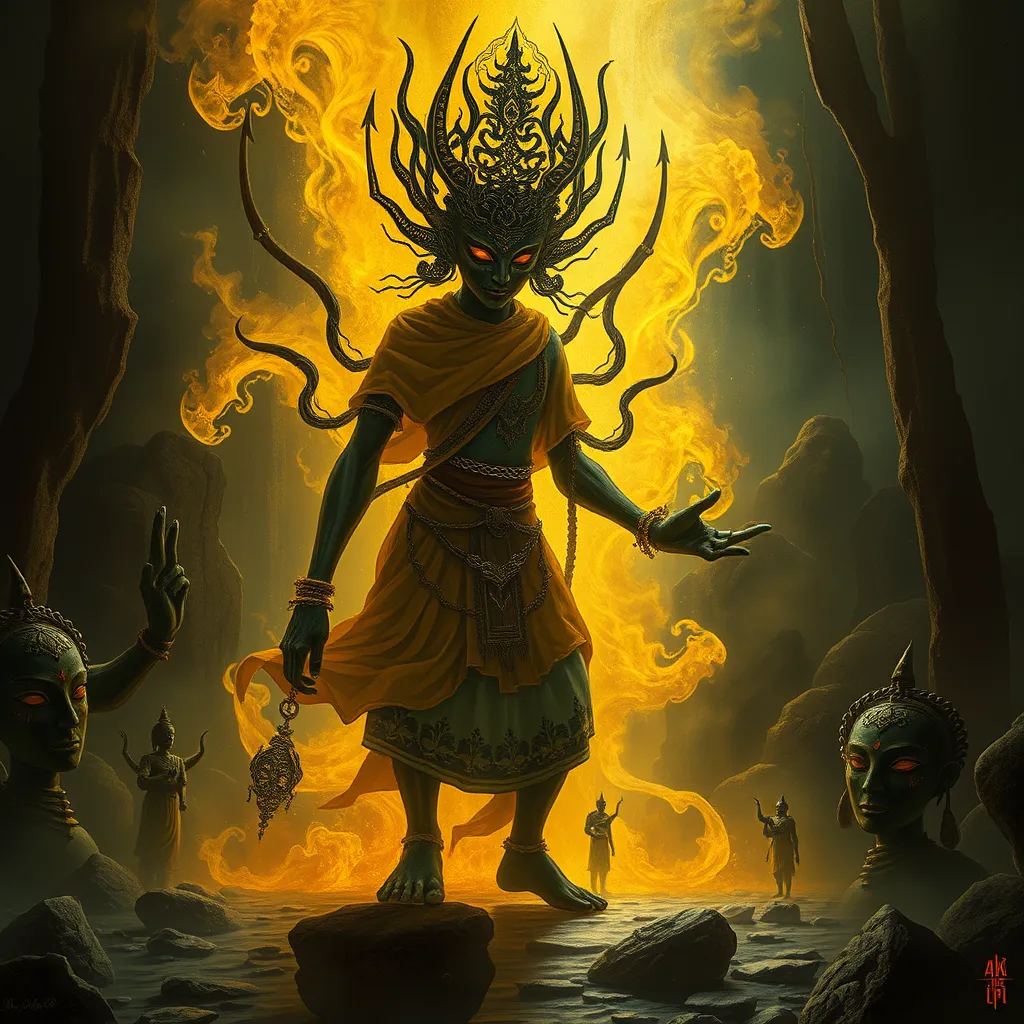The Djinn of Fire: Exploring Ifrit in Islamic Lore
1. Introduction to Djinn in Islamic Culture
The concept of djinn is deeply woven into the fabric of Islamic culture and theology. Djinn, often translated as “spirits” or “genies,” are supernatural beings created by Allah from smokeless fire, as mentioned in the Quran. They exist in a parallel world to that of humans and possess free will, allowing them to choose between good and evil.
In Islamic theology, djinn are significant not only as beings that interact with humans but also as entities that can influence the spiritual and moral landscape of the world. The belief in djinn has permeated folklore, literature, and popular culture, solidifying their role as an essential aspect of Islamic cosmology.
2. Understanding Ifrit: The Fire Djinn
Ifrit, a specific type of djinn, is often associated with fire and is typically depicted as a powerful and malevolent being. The etymology of the term “Ifrit” is rooted in Arabic, where it is derived from the word “afrit,” which refers to a rebellious or evil spirit. Ifrits are characterized by their immense strength, cunning, and often their tendency to act in opposition to humans.
Distinctions between Ifrit and other types of djinn include:
- Elemental Association: Ifrits are primarily associated with fire, while other djinn may be linked to air, water, or earth.
- Behavior: Ifrits are often depicted as more hostile and destructive compared to other djinn, who may be more neutral or benevolent.
- Physical Appearance: Ifrits are commonly described as large, fearsome beings, sometimes with wings, reflecting their fiery nature.
3. The Role of Ifrit in Islamic Texts
Ifrit appears in various Islamic texts, including the Quran and Hadith. One notable mention of Ifrit can be found in Surah An-Naml (27:38-40), where Solomon converses with a powerful Ifrit who boasts the ability to bring the throne of the Queen of Sheba to him. This story highlights the strength and cunning of Ifrit, showcasing both their power and their potential for servitude under wise leaders.
In addition to the Quran, Ifrit has appeared in numerous Hadiths and Islamic literary works, often symbolizing the trials and temptations faced by believers. These accounts serve to illustrate moral lessons, emphasizing the importance of faith and the dangers posed by malevolent beings.
4. Ifrit in Folklore and Mythology
Across different Islamic communities, Ifrit has taken on various forms and characteristics. In Arabic folklore, Ifrit is often depicted as a trickster figure, capable of shape-shifting and using deception to outsmart humans. Notable tales include:
- The Tale of the Fisherman: In “One Thousand and One Nights,” a fisherman encounters an Ifrit trapped in a bottle, illustrating the theme of cunning and the consequences of greed.
- Stories of Capturing Ifrit: Many legends tell of heroic figures who manage to capture or outwit Ifrits, often using cleverness or divine assistance.
These tales serve to entertain while embedding moral lessons about humility, the importance of wisdom, and the recognition of one’s limitations in the face of powerful forces.
5. Ifrit as a Symbol of Evil and Temptation
Ifrit is often portrayed as a symbol of evil and temptation in various narratives. As an antagonist, Ifrit represents the darker aspects of free will—choosing to serve malevolent purposes. This portrayal is crucial in many Islamic teachings, where Ifrit serves as a warning against moral corruption and the allure of sin.
The analysis of Ifrit’s role often connects to broader themes in Islamic theology:
- Moral Lessons: Ifrit’s actions often lead to cautionary tales that warn individuals against pride, greed, and disobedience to God.
- Struggle Between Good and Evil: The existence of Ifrit emphasizes the ongoing battle between righteous forces and those that seek to lead humanity astray.
6. Ifrit in Popular Culture
In contemporary media, Ifrit has found a place in various forms of entertainment, including literature, film, and video games. These portrayals often draw on traditional characteristics of Ifrit but may also introduce creative reinterpretations. Some notable examples include:
- Literature: Ifrit appears in fantasy novels, often as powerful adversaries or allies with magical abilities.
- Film: Movies inspired by Middle Eastern folklore sometimes feature Ifrit as a central villain or a misunderstood creature.
- Video Games: In many role-playing games, Ifrit is depicted as a fire elemental or summon, reflecting its fiery nature and formidable power.
These representations, while entertaining, often differ from traditional Islamic views by emphasizing adventure and fantasy over the moral and theological implications present in Islamic texts.
7. Theological Implications of Ifrit
The presence of Ifrit in Islamic culture raises important theological questions regarding the nature of good and evil. Ifrit serves as a reminder of the potential for evil within creation and the consequences of free will. Discussions of Ifrit often touch on topics such as:
- Good vs. Evil: Ifrit embodies the struggle between good and evil, prompting believers to remain vigilant in their moral decisions.
- Free Will: Ifrit’s ability to choose evil actions highlights the Islamic belief in free will and personal accountability.
- Divine Justice: The portrayal of Ifrit reinforces the concept of divine justice, where ultimately, good prevails over evil.
8. Conclusion: The Legacy of Ifrit in Islamic Tradition
Ifrit remains a significant figure in Islamic tradition, embodying complex themes of morality, temptation, and the spiritual battle between good and evil. From its origins in sacred texts to its evolution in folklore and contemporary culture, Ifrit has captivated the imagination of many.
The enduring fascination with Ifrit illustrates not only the richness of Islamic lore but also the universal themes of struggle and moral choice that resonate across cultures. As a symbol of the challenges faced by humanity, Ifrit continues to serve as a powerful reminder of the importance of faith, wisdom, and the quest for righteousness in a world filled with temptation.



